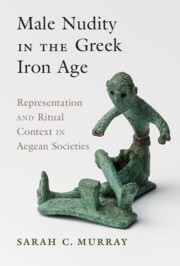Why did the male nude come to occupy such an important place in ancient Greek culture? Despite extended debate, the answer to this question remains obscure. In this book, Sarah Murray demonstrates that evidence from the Early Iron Age Aegean has much to add to the discussion. Her research shows that aesthetics and practices involving male nudity in the Aegean had a complicated origin in prehistory. Murray offers a close analysis of the earliest male nudes from the late Bronze and Early Iron Ages, which mostly take the form of small bronze votive figurines deposited in rural sanctuaries. Datable to the end of the second millennium BCE, these figurines, she argues, enlighten the ritual and material contexts in which nude athletics originated, complicating the rationalizing accounts present in the earliest textual evidence for such practices. Murray's book breaks new ground by reconstructing a scenario for the ritual and ideological origins of nudity in Greek art and culture.
Publication Type
- Book



